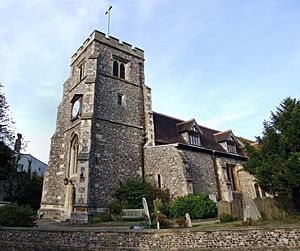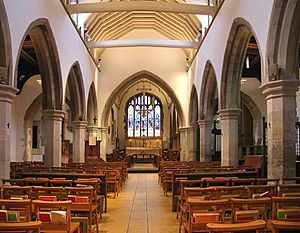St John the Baptist, Pinner facts for kids
Quick facts for kids St John the Baptist, Pinner |
|
|---|---|

St John the Baptist, Pinner
|
|
| Location | Church Hill, Pinner, London |
| Country | United Kingdom |
| Denomination | Church of England |
| Website | pinnerparishchurch.org.uk |
| Architecture | |
| Heritage designation | Grade II* |
| Administration | |
| Parish | Pinner |
| Deanery | Harrow |
| Archdeaconry | Northolt |
| Diocese | London |
St John the Baptist Church in Pinner is an old church that belongs to the Church of England. You can find it on Church Lane in Pinner, which is part of London.
Contents
The Church's History
This church was officially opened for worship in 1320. Most of its original parts were built in the 1300s. At first, it was a smaller church connected to St Mary's Church in Harrow. The Archbishop of Canterbury, a very important church leader, was in charge of the area.
Over many years, St John's Church slowly became more independent. By 1766, Pinner became its own separate church area, no longer needing to report to Harrow.
Famous People Connected to the Church
Some interesting people are linked to St John the Baptist Church. Henry James Pye, who was a special poet for King George III, is buried inside the church. Also, a man named William Skenelsby, who was said to be 118 years old when he died, is buried in the churchyard.
Since 1951, the church has been a Grade II* listed building. This means it is a very important historical building that needs to be protected.
What the Church Looks Like
The tall tower at the west end of the church and the entrance porch on the south side were built in the 1400s. A special room called the vestry was added in 1911. It was designed by an architect named Temple Moore.
Beautiful Windows and Roof
The church has many stained glass windows. They come in different designs and were made at various times. Two of these beautiful windows were created by an artist named Ninian Comper.
In the late 1800s, the edges of the windows were fixed by John Loughborough Pearson. A wealthy local landowner, A. W. Tooke, paid for this work. Pearson also designed the current roof of the church, which has pointed gables. This new roof replaced an older one that had windows in the attic.
Inside the Church
The south chapel, a smaller area within the church, was first built in 1859 and made larger in 1880. Inside the church, you can find some very old and special items.
- There is an eight-sided baptismal font from the 1400s. This is where babies are baptized.
- The rails around the altar, where services are held, are from the 1600s.
- An old oak chest is also there, which must be older than 1622 because records show it needed a new lock that year!
- The cover for the baptismal font was added in 1909.
Important Memorials
The church also has many memorials to remember people. One memorial inside the church is for Sir Christopher Clitherow. He was a former Lord Mayor of London and owned land in Pinner in the 1600s.
Outside in the churchyard, on the south side, there is a very unusual memorial. It looks like a stone pyramid and has a fake stone coffin inside. This was built by an 18th-century plant expert named John Claudius Loudon to remember his parents.
 | Selma Burke |
 | Pauline Powell Burns |
 | Frederick J. Brown |
 | Robert Blackburn |


